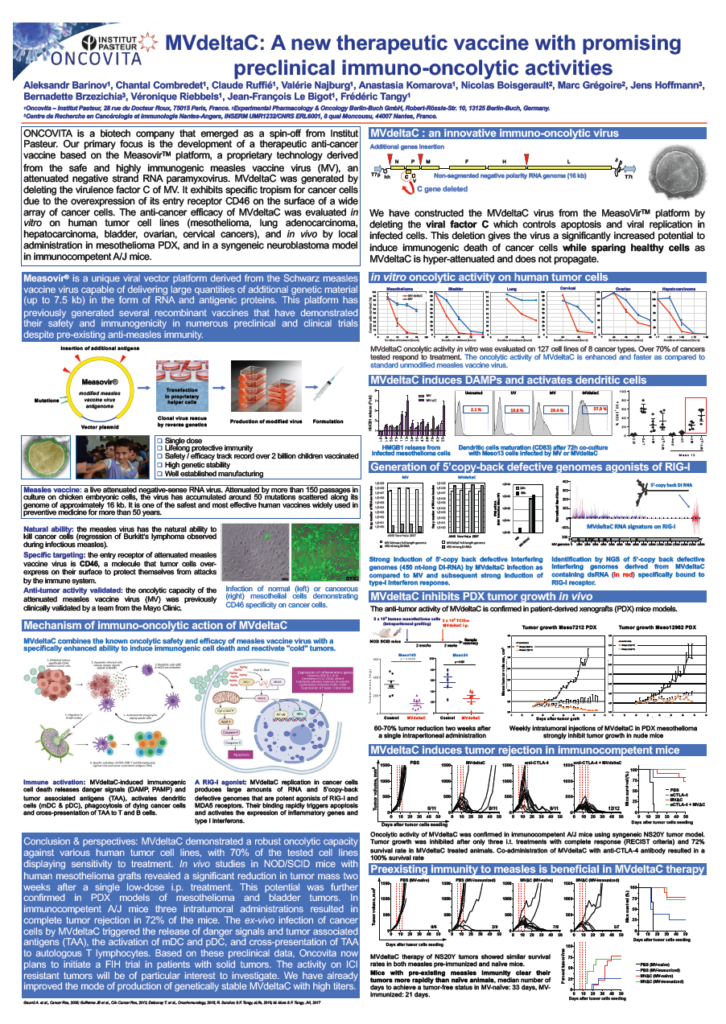October 16, 2023
Background:
Oncovita, a biotech company spin-off from Institut Pasteur, Paris, is developing a therapeutic vaccine in oncology based on Measovir®, a proprietary technology derived from the safe and highly immunogenic measles attenuated vaccine virus (MV). MV is a paramyxovirus with a negative strand RNA genome. The MV specific tropism for cancer cells is due to the overexpression of its entry receptor CD46 on the surface of most cancer cells.
Methods:
We constructed MVdeltaC, a genetically modified MV by deletion of its virulence factor C. We evaluated its immuno-oncolytic activity in vitro on over 40 human tumoral cell lines, including mesothelioma, lung adenocarcinoma, bladder, ovarian, cervical cancer and hepatocarcinoma, and in vivo by i.p. or i.t. administration in different patient-derived xenograft (PDX) mesothelioma and bladder models, and finally in a syngeneic model of neuroblastoma in immunocompetent A/J mice. The mode of action (MOA) has been investigated ex vivo using human primary immune cells.
Results:
in vitro, MVdeltaC exhibited a strong oncolytic capacity which was 2 to 3 times greater than standard MV against a series of human tumor cell lines. MVdeltaC was active in more than 70% of the tested cell lines. In vivo, a single low dose given intraperitoneally in NOD/SCID mice grafted with human malignant mesothelioma induced a strong reduction of tumor mass two weeks after treatment. This potential was confirmed in PDX models of mesothelioma and bladder tumors by weekly administration of MVdeltaC that completely controlled tumors growth. Finally, in immunocompetent A/J mice, only three i.t. administrations resulted in tumor regression and even total disappearance in 70% of mice. The animals that completely rejected the tumors were re-challenged on the other flank 3 months later with the same tumor cells. No tumor growth was observed, suggesting an immune protection. In ex-vivo MOA experiments with human autologous primary cells, we demonstrated that the infection of cancer cells by MVdeltaC triggers the release of danger signals and tumor associated antigens (TAA), activation of mDC and pDC, phagocytosis of dying cancer cells and cross-presentation of TAA to autologous T lymphocytes. Moreover, we demonstrated that MVdeltaC produces particularly high amounts of defective interfering genomes, which are agonists of RIG-I pathway, potentially responsible for the anti-tumor capacity.
Conclusions:
MVdeltaC demonstrated a very efficient immuno-oncolytic activity. Based on these promising preclinical data, Oncovita plans to initiate a FIH trial in patients with solid tumors. The activity on CPI resistant tumors will be of particular interest to investigate. We have already improved the mode of production of genetically stable MVdeltaC.
Frédéric Tangy (IP + Oncovita)
Aleksandr Barinov (Oncovita)
Chantal Combredet (IP)
Claude Ruffié (IP)
Valérie Najburg (IP)
Nicolas Boisgerault (Inserm)
Marc Grégoire (Inserm)
Bernadette Brzezicha (EPO Berlin),
Jens Hoffman (EPO Berlin),
Véronique Riebbels (Oncovita)
Jean-François Le Bigot (Oncovita)
Oncovita and Institut Pasteur, Paris, France
Inserm UMR 1307 / CNRS UMR 6075, Nantes, France
Experimental Pharmacology & Oncology, Berlin, Germany

